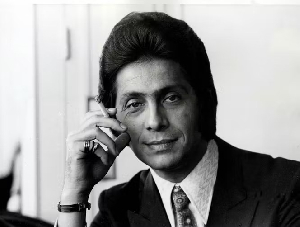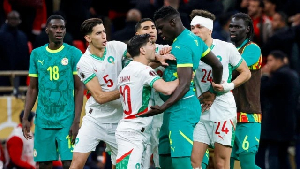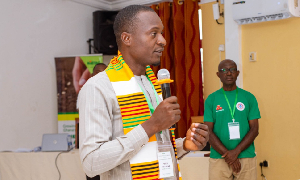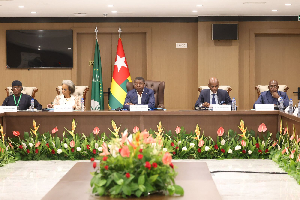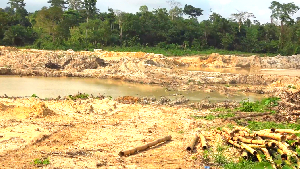KD: So those who suggest that technically, Prof. Mills is the person around whom the NDC should revolve at this time is not really the hard truth?
OA: Well, I don't think that. I haven't heard that. But in any case, I don't think one should be thinking in terms of rebuilding the party around any one particular personality. I think that sort of thinking create problems. I think that we should all collectively work together to rebuild the party.
KD: OK, but the party was built around the personality of J.J. Rawlings. Wasn't it?
OA: Yes, but only up to a certain point. J.J. Rawlings also stood for a certain value system and I think that those who belong to the party subscribe also to the value system and the party had existed for so long. You know, that they have a vested interest in it. If so, we won't see the party any more in terms of one personality.
KD: Yes, Dr. Asamoah, since December 28 and then you know the NDC lost this election. You know President Kufuor has taken over and he's made efforts to put together his government and the like. I am just curious to know, were you at the swearing-in ceremony?
OA: Yes, I was.
KD: You were?
OA: Yes.
KD: Then where from the rumour that you were not there?
OA: I was there. I think if you've studied my attitude, I don't always take the front role of things. You know what I mean. People like to be seen and photographed. You know I don't want to really do that. I take a seat in a corner somewhere and then.
KD: And even the eagle eyes of Paul Adom Octere couldn't find you in that crowd? What did you do?
OA: I was there alright at the end of it, I was talking with Prof. Adu Boahen and the wife and then we had a chat and some photographers took photographs of us. You know, so I was there. I didn't attend the ceremony at the Independence Square just for the simple reason that. I anticipated it will be chaotic and I wasn't going to get crushed by some mob.
KD: Do you think that, that was a complete disaster on the part of protocol?
OA: I don't think it is the fault of protocol. I think if I remember correctly, the advice was given that both that part of the ceremony and the swearing-in should be done at one place. Because of the difficulties of moving large crowds between two places at short notice, and I think that was the correct advice but the NPP team did not accept that advice and I anticipated that with the attitude they took, there will be chaos and I wasn't going to be involved in that kind of chaos. It was not the fault of Protocol.
KD: OK. Were you part of the transition team?
OA: Yes. But the transition team started business before I sort of came in the middle. You know, I was in my village. I voted in the village and I stayed in the village and spent the new year.
KD: OK.
OA: You know so they started working so I really didn't take a very active part in the work of the transition.
KD: OK, but the transition process when one assumes, is still moving on and of course the issues to be dealt with. What are your observations about President Kufuor and what he is been able to do so far, nomination of Ministers and the like?
OA: Well, the Ministers are yet to be vetted, of course when they are vetted and they assume office then one can think in terms of assessing their performance but talking in-terms of performance right now, you can talk in- terms of performance of the President because he has been involved in one or two things but, we wish him well. I wasn't very impressed about his speech at the independence square. He didn't say anything, apart from talking about the Ministry of Women's Affairs. There he didn't say much.
KD: You don't think the Ministry of Women's Affairs isn't a big issue? He talked about zero tolerance for corruption, he talked about unifying the country.
OA: Oh yes but then you see it's not the question of what you want to do, it's the question of how you are going to do it. You would have expected that, I mean these things have been talked about all the time during the campaign. So you would have expected that they had specific programmes that will say look in the next six months this is what I am going to do and this is the way I am going to do it. So I was disappointed by that speech, I must say.
KD: But Dr. Asamoah in fairness to the President, his inaugural speech was not a policy statement speech. It wasn't as though he was addressing the nation on the state of the economy or something like that. This was a post inauguration speech that could just spell out the general agenda. In fairness to him he didn't cover the most basic issues?
OA: Well I don't think he did ....., I think it was so general that it didn't contain very much. I thought an occasion of that nature, of course it's the way I look at things. He probably thought differently and perhaps in the future he will be more specific. But I thought on an occasion of that nature with the whole world looking on and considering that one had criticized what has been going on for so long and that one will want the world to see that one was purposeful
And that these are things one will like to do and the whole world will say yes this is the guy who is really coming to put matters right. We are still waiting to see how he is going to put matters right.
KD: What about the Togo trip, how do you access the media furore over that?
OA: Well I think he was being taken on because of his commitment to democracy and it's felt that he ought not be with somebody who hadn't shown an equal commitment to democracy but really foreign relations are not based upon such considerations. Really I don't see that it was wrong for him to visit. You know, but he will have to show in the course of time that he is committed to democracy in Togo the way he is committed to democracy in Ghana and I think when he does that, he would have created the appropriate balance and of course maybe he had the support from there so he had to go.
KD: Maybe? You were in government at that time and I assume that you had your people around, knowing you would know. Did they receive support from Togo?
OA: Well, I don't know, I can't tell
KD: What about the closure of the border?
OA: And that could have prevented some Ghanaians from coming to vote. Yes naturally because there are Ghanaians living across the borders, and yes they were entitled to come and vote. And I remember this issue had occurred or had been discussed during the campaign.
KD: But why didn't those Ghanaians then go through that special voting process at the Ghanaian Embassy for example?
OA: We don't have that procedure. Ghana has never developed that kind of system. If you want to vote, you have to come to Ghana to vote.
KD: You were criticized a lot for holding, they said, two positions of Attorney-General and Minister of Justice. We are yet to hear anything about whether your major critics are planning on changing that.
OA: I don't know if anybody wants to change that. You cannot change it because it is the Constitution of Ghana under Article 88 Clause (1) which states that the Attorney-General of Ghana shall also be a Minister of State. So unless you amend the Constitution
KD: Dr. Asamoah following the loss of the NDC on December 28 elections, there seems to have been some kind of a backlash. Some say the pressure is being piled on the NDC. Fingers are being pointed. This morning we picked up a paper that said files were being burnt at the Ministry of Finance and of course these issues of the Tema Oil Refinery (TOR). You know levels of corruption that were taking place at some state organizations. Do you think this is unfair?
OA: We've always had a very bad press.
KD: You think it's the media?
OA: Yes, I think that things are played up a little bit against us. Maybe we did not make enough of an effort to cultivate the press or to try to explain our side of the story.
KD: Well let's talk about a particularly sensitive case. Having been Attorney-General for so long, Prof. Attah-Mills in the course of his campaign, when he was asked about reopening the case of the murdered judges said that he wouldn't re-open that case and then digging old wounds and the like, looking from where you stand shouldn't such a case be reopened?
OA: You know with law there is always the consideration that there must be an end to litigation and this matter has been gunned into before and certain people had been punished for it. So what will be the purpose of another trial and investigation?
KD: Well what about those who say that there are still unresolved questions?
OA: Well, I think that there may always be unresolved questions with regards to any crime or any offence but you can't keep on endlessly talking about a particular issue and then raising questions ... Sometimes memory fades and this is the reason why in law we like to end litigation at some point and some times you can have injustices in situations where because memories have faded, things that are not facts, become the basis for judgement.
KD: But what if there was even a sliver of evidence to suggest that there are people who are still living who may have had some complexity in those tragic murders and those people are alive and well and possibly quite, comfortable, wouldn't suggest that justice should be pursued to its logical conclusion and that conclusion will be to make sure any one who had any involvement was punished for it?
OA: But you see it depends on what you want to achieve. If you believe that there should be an end to litigation, that I say and that is what the law believes in then of course at some point where there has been some litigation on an issue and people have been punished for it, you end it there. You can of course talk about it, I mean you still speculate, I mean nobody can be denied the right to speculate or to talk about issues of that nature but not to go through another legal process again. I mean, this is the point I am trying to make otherwise that can happen in any case. In any case of course, the judicial system gets very chocked with this kind of thing.
General News of Monday, 29 January 2001
Source: The Dispatch
INTERVIEW: Obed Asamoah Speaks Out (Final Part)
Entertainment
